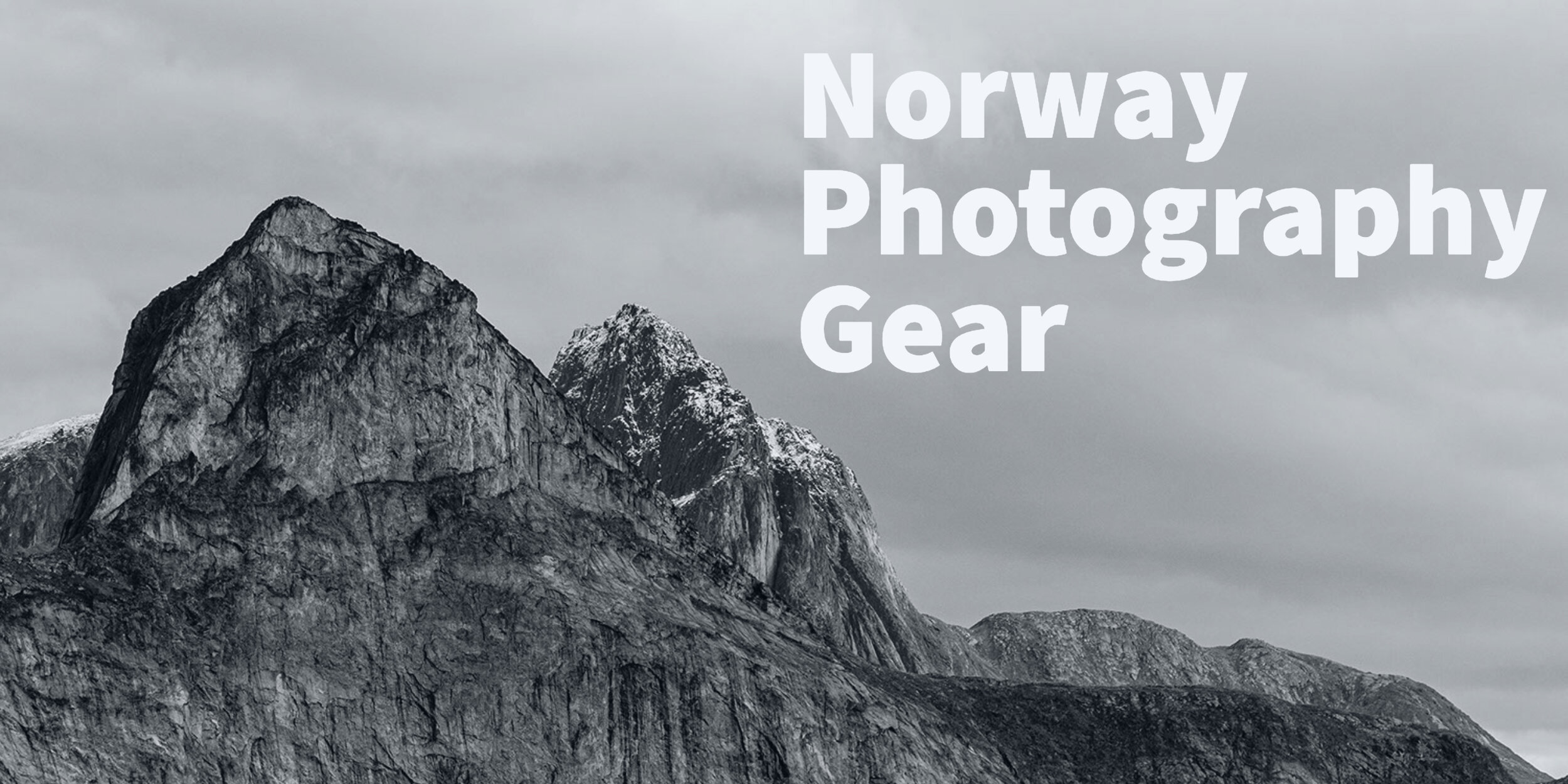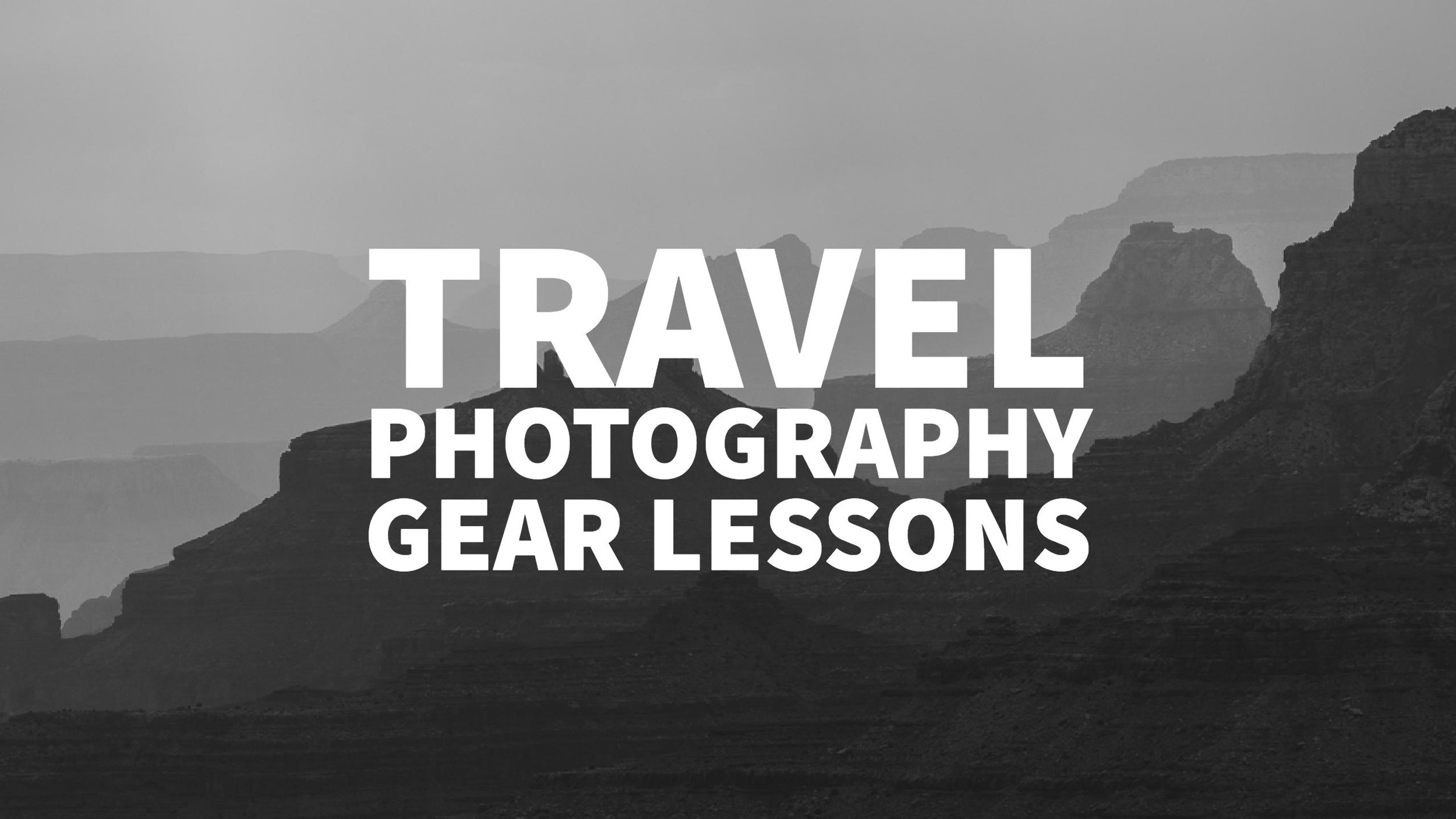Every couple of years I do a big RV-Trip and while traveling to this marvellous places is the main activity - taking photos is a must. My girlfriend gets photo crazy on these trips as well and unlike many other photographers who go on vacation with a reduced kit, we take out all the stops and we actually gear up for our trip.
The gear around the gear - a 21ft RV rented for the road trip
While planing the trip I’m in charge for the photo gear and I’m responsible for packing all the gear we need - and since there is always the uncertainty if you need a piece of gear or not, I tend to overpack.
As a reminder for myself and maybe as an inspiration for the reader I collected my thoughts on most of the photo equipment I brought on the trip and also. Did I use it, did I need it - should I bring it again?
Photo gear we used most and will definitely be on our next trip
Nikon D5300
This was the newest addition to our camera collection and should replace the Nikon D3000 which we used before. This camera was mainly used by my girlfriend as we figured that she liked that it was lighter and with fewer controls than our D7000 while having a great image quality.
We used it mostly in combination with wide angle lenses to capture the landscapes, so it’s not surprising that 54% of all the keepers from the trip where shot this camera.
Grand Canyon shot with a Nikon D5300 and Sigma 18.35 1.8
Nikon D7000
The other workhorse is the Nikon D7000. While the sensor is not as high resolution it has great ergonomics and it’s great in combination with the full frame Nikon AF-S 70-300 VR F4-6.3. We used it to capture telephoto landscapes and wildlife photography. It’s faster frame rate and the possibility to have two user settings on the mode dial is great.
A turkey vulture shot close to the Golden Gate Bridge in San Francisco with a Nikon D7000
Sigma 18-35 1.8
I love this lens. It’s sharp as hell and the images it produces are great. Over 60% of the keepers where shot with this lens and I can highly recommend this lens to all crop sensor camera owners. We used it most at 18 and 35 mm and the 1.8 Aperture was great for the astrophotography we did.
Star Party at the Grand Canyon Visitor Center - Nikon D5300 with Sigma 18-35 1.8
Nikon AF-S 70-300 VR F4-6.3
This is one of the most underrated lenses out there. In fact you can grab them pre-owned in mint conditions for half the list price. I’ve got mine for 300 Euros and I love it - now that the new AF-P Model is out, I’m sure it will be even cheaper soon. It is sharp and has a great focal range. It’s also not that heavy for the size and with the 2 VR settings it’s great for situations where you are on a boat or in the car and shoot while on the move.
I had this lens on the D7000 most of my shooting and it was just the right lens for telephoto landscapes and capturing the birds flying close by at Grand Canyon National Park.
Bryce Canyon with Nikon D7000 and Nikon AF-S 70-300 VR F4-6.3
InstaAir 360
This little 360° camera attachment for Android phones is great. I used it a lot (almost at any major spot) to get a short video in full spherical view. The quality is more than ok for the price and ease of use and transports you back to the moment you took the photo or video. How better describe the actual situation in Antelope Canyon that by taking a video in 360° while you are stuck? One of the best things is that it is so small and I had it in a small neopren pouch attached to my belt or backpack. Quick to get out, attach, shoot and store it away.
Oneplus 3T
Smartphones have become pretty great for general photography - and the easiest video camera you already have with you. The Oneplus 3T is not expensive and has great optical stabilisation for video and the video quality is sufficient for our standards. The stabilisation is actually so good that I didn’t bother taking out the gimbal most of the time for panorama shots. Only when I wanted to take video while walking I used the gimbal.
The quick snapshot is not to underestimate to tell a story - dinner is almost ready - shot with Oneplus 3T
Sirui 1005N Tripod
We actually had 2 tripods with us (the second one was for Antelope Canyon, but normally would not be on my packing list) and the Sirui was really a nice piece of kit. It’s light enough and sturdy enough even for some bigger lenses and is a must for long exposures, astro photography etc.
Shooting in Upper Antelope Canyon is only possible with a tripod - at least it makes it easier
Lowepro ProTactic 350 and Flipside 450
I bought this two backpacks to decide which one I needed to bring all the gear. I actually kept both. The ProTactic was smaller than I thought, but was best as a sturdy, secure day pack with plenty of attachment options. The Flipside is more traditional (also secure) bigger backpack and was great for the space it offers. We never had any trouble bringing the bags into the cabin while flying, since both are backpacks and look smaller than they are - and if you are smart enough to wear them while checking in, the personell is not tempted to weigh them either… they couldn't be heavy right 😉
Photo gear that we used little but was essential
Tamron AF 150-600 VC SP 5.6-6.3
The big beast was actually not a big deal to bring, as it has it’s own case I could bring on the plane as a personal item (just like a laptop bag), but it took almost 2 weeks until I used it for the first time. In the end I’m happy with the shoots I’ve got with this lens.
Turkey Vulture shot at Grand Canyon - Nikon D5300 with Tamron AF 150-600 VC SP 5.6-6.3
Olympus E-PM1
The smallest micro four thirds camera ever produced is my always in the bag camera and I only used it once. I brought it because of it’s size in the dry bag during our Kayak trip and discovered then that it did fit in the dry compartment. We had planned to use the GoPro on that excursion, but ended up using this camera. Image quality in bright sunlight is excellent and an ideal tool for occasions where you really cannot bring something bigger.
The Olympus E-PM1 fits in the small opening visible in this image
Table Top Cullmann Magnesit Copter Tripod
This little sturdy tripod is the best of it’s kind I’ve seen. It’s sturdy, light, and has a small ball head and is so small that you can bring it into places that normally don’t allow tripods - like museums, or in our case Alcatraz. It can hold a DSLR with a wide angle lens if you know how to position the legs and helped me get the long exposures I wanted.
Alcatraz Prison shot with Nikon D7000 with Kit Lens 18-55 3.5-5.6 and the Cullman Magnesit Copter Multiple Tripod
Photo gear to bring more of next time
SD Card holders
I bought 2 of the tough SD Card holders and they where filled with cards. It would have been great to have one more where I could put a set of cards to bring on a hike. This way the holders with filled up and empty cards could stay in safety and I had more then just the cards in the camera with me.
SD Cards
Yes, more is more 😃 I had almost a Terabyte, but still wasn’t sure how much I would use them and didn’t do any GoPro on the road timelapses. I did in the end use “only” 600 GB, but the incremental cost of a couple of SD cards more would have been probably worth it. Also, buy every time you see a deal somewhere - I thought I wait (because memory prices always go down right?) and had to pay more in 2017 than I did 2015. Flash storage is more and more in demand and sd cards are low priority, so the prices do go up right now.
Additional USB Hub
I use a USB Hub for my mobile backup solution - and it failed during the trip. It was the first time that a hub failed on me, and the Anker replaced it (when I was back home), but I was left with just one (instead of two) backups I planned to have of my images. You might wonder how easy it is to replace a powered USB Hub while on the road in Utah and Arizona - it’s almost impossible. Walmart didn’t have anything on shelf (and just one model anyway), and the local computer store in Page had run out years ago (Amazon you know). It was pure luck that we dropped in again to the Walmart the next day for some groceries and passed the same rack - findig the giant 8port Hub hanging there - for $48. Well I bought it - backup is important to me. Next time I will bring a second of the small Anker Hubs …
Protection Filters
I know this is controversial. I’m not a fan of protection filters, because I’m cheap and therefore the filters I have do degrade the image quality. For that reason I didn’t bring any - and I don’t have them for all my lenses anyway. But there is one single case where I would have needed it. There was especially strong winds during our visit to Bryce Canyon and there is plenty of dust which not only covered us, but also damaged the front element of my beloved Sigma 18-35. It’s a small dent which doesn’t degrade the image quality - but it could have been avoided.
A monopod
My tripod has the option to become a monopod by unscrewing a leg and by mounting a plate on top. Still I didn’t do it, even if I actually longed for a monopod for use with my Tamron 150-600. I have a Sirui Monopod and should have taken with me - well next time.
Photo gear that we would maybe bring again
Polarizing filters
I stopped using polarizers for general photography as the results where either not visible or too much. I still like to use them in damp, overcast or wet situations like near waterfalls and seascapes - but I didn’t really need them this time. Especially since I was in charge of the telephoto shots where polarizers aren’t as useful anyways.
Reflector
Not sure because I just bought a reflector set before the trip and didn’t practice with it - so it wasn’t with me during our hikes where I might wanted to use it. But then again I like mostly to capture the scene and then make some additional selfies and “proof I’ve been there” pictures. Until now I placed myself in a way where the light was good and if I had any shadows I just retouched them in Photoshop … maybe I should make a point of taking better portraits, but until now it wasn’t the gear that made me change my preferences.
Backup lenses
I have most of my focal ranges covered by multiple lenses. From Kit to entry level lenses and cheap primes I upgraded to more reach or better quality. These “old” lenses are not much worth on the used market so I kept them. This means that I have backup lenses which I brought in case of a catastrophic failure. I’m not sure if I would do it again. I take care of my stuff and 1 backup wide angle (which we actually needed for one shoot where we both shot wide angle) would have been enough.
Smooth C Smartphone Gimbal
Since I decided that I was happy with the video I can take with a smartphone I wanted a way to get cool looking footage. I bought the gimbal to achieve that and it works great. The setup is quite easy and while walking you get great smooth footage. The downfalls are that if you have strong winds it will not work and it is quite unwieldy when not in use. There is no easy way to strap it to your body when not in use and when it was in my backpack it stayed there - even though I had a quick access port configured for it.
I have another compacter one coming through a Kickstarter Project (delayed as usual by 6+ months) which maybe will be quicker and easier to stow away when not in use.
All in all - great if you want to just shoot video and have it in use all the time - the battery lasts forever. Not so good if you also want or need to stow it while taking photos.
Selfie Sticks
I have two selfie sticks. A very small one, not too sturdy for the classic selfie in front of the attraction shot - just used two to three times. A sturdy medium sized one, which has a normal 3/4” thread and has multiple uses. I wanted to use it with my Insta360, but did only once, because it was awkward with a vertically mounted phone plus the device. I ordered an extra mount for the insta360 to attach it remotely to my phone and I will see if that makes it easier to use.
Action Camera
I have an rather old GoPro Hero 2 as an action cam with the usual accessories. I never bothered updating it to a newer model because I use it so infrequently. Only when I’m IN the water basically I use it and it works fine. I even hunted down for years ebay to get the original diving case (with a flat front lens) to get not decent underwater shots.
On this trip I used it only while on the Kayak on the Colorado river - and guess what, I also had my Olympus E-PM1 with me on that boat and took photos with that. Turns out, modern Kayaks have small water tight compartments and you can store a micro four thirds camera securely in there.
So next time I either reduce the kit or just take it with me if I really know that I will go UNDER water with it.
Photo gear I will not take on a trip again
Remote & Intelligent Triggers
I have and brought a Alpine Labs Pulse, a Triggertrap and Yougnuo Flash Triggers (you can use as remote triggers for the camera) - and I didn’t use any of those. I realised that I’m not that much into timelapses and if I wanted to shoot one, I could use the functionality included in my Nikon Bodies.
Same for “shutter free” triggering. I used the shutter delay plus the 2 second self timer and the results where great. No need to have those cables and batteries in my bag - and to be honest, also no need to look any further to get newer/better/… ones.
While these triggers look small - it adds up to the mess. Trigger plus cable, plus pouch, you get it.
Neutral Density Filters
I just have one for one lens and I have used it in all the time I own it just once … Even though on this trip I had one occasion where I wanted to blur a waterfall, I just took 20 pictures and blended them in Photoshop. Yes more post processing - but since I had over 2000 photos where I had to do some sort of Panorama stitching or HDR processing, those extra 80 frames (4 different waterfalls) didn’t really matter - and I had the possibility to get sharper results cause I could blend in a sharp image the surroundings of the waterfall to the soft waterfall itself.
15 stacked images to create the soft waterfalls everyone loves
Same here - I will not look any further to buy additional filters nor take the one I have with me.
Second Tripod
We brought the second tripod because of Antelope Canyon - the photo tour stated that every photographer needed a tripod, but in the end they just wanted to see that you had a big camera. Two other guests shot handholding and my girlfriend switched to not use the tripod on the way back through the canyon.
Conclusion
When I started this post I thought I would have a big list of things I will left behind the next time - it turns out that the list is not so black and white after all. At least i have a better idea and I hope that it might help you (if you endured this long post) to think about what to pack. Actually feel free to share your experience in the comments.























Comments (0)